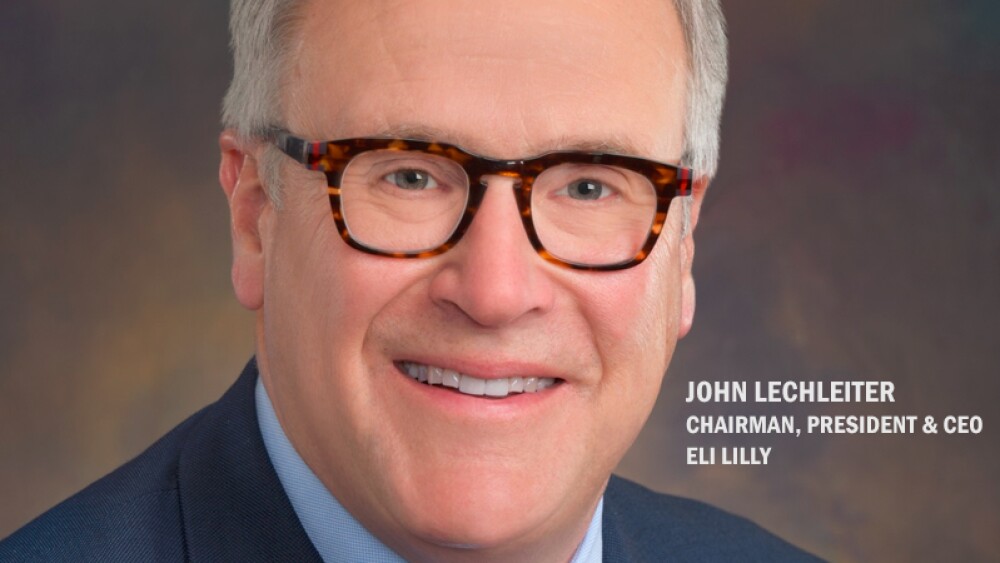November 23, 2016
By Mark Terry, BioSpace.com Breaking News Staff
Indianapolis – Eli Lilly and Company ’s shares fell in early trading after it announced today that its Alzheimer’s drug, solanezumab, failed to meet the primary endpoint in its EXPEDITION3 Phase III clinical trial. The drug candidate didn’t show significant improvement versus placebo in mid-stage trials, but the company changed the study design to have a single primary endpoint, improvement in cognition.
Solanezumab didn’t show a statistical slowing in cognitive decline compared to the placebo arm. That decline was measured by the ADAS-Cog14 (Alzheimer’s Disease Assessment Scale-Cognitive subscale).
“The results of the solanezumab EXPEDITION3 trial were not what we had hoped for and we are disappointed for the millions of people waiting for a potential disease-modifying treatment for Alzheimer’s disease,” said John Lechleiter, chairman, president and chief executive officer of Lilly, in a statement. “We will evaluate the impact of these results on the development plans for solanezumab and our other Alzheimer’s pipeline assets.”
More data will be released at the Clinical Trials on Alzheimer’s Disease (CTAD) meeting on December 8.
Many Alzheimer’s drugs are being studied but few are succeeding. The Pharmaceutical Research and Manufacturers of America indicates there are 77 experimental compounds being developed for Alzheimer’s this year. The top six players in this area are Lilly, AstraZeneca , Merck , Biogen , Roche and Pfizer , although GlaxoSmithKline , Amgen , Johnson & Johnson and many others also have Alzheimer’s programs.
For the most part, these companies are focused on two mechanisms of action. Lilly, Roche and Biogen are focused on developing antibodies that attack beta-amyloid, the protein plaques that build up in the brain of Alzheimer’s patients and cause the brain damage, resulting in cognitive decline.
AstraZeneca, Lilly and Merck are focused on BACE inhibitors, which, rather than mop up the beta-amyloid, work to prevent its development completely.
Other companies are working on drugs that affect tau, which is a tangle of proteins that tends to occur later in the disease after beta-amyloid has done its damage.
Lilly’s took a hit in pre-market trading, dropping from $75.99 to $65.37, or about 14 percent.
The company indicates that the outcome of the EXPEDITION3 trial will result in a charge in the fourth quarter of about $150 million (pre-tax), or about $0.09 per share.
“Lilly has strong growth prospects without solanezumab,” said David Ricks, Lilly’s incoming chief executive officer and president of Lilly Bio-Medicines, in a statement. “Driven by new product launches, we continue to expect to grow average annual revenue by at least five percent between 2015 and 2020. Over that time frame, we also expect to increase our margins and provide annual dividend increases to our shareholders.”
Biogen’s also dropped about nine percent in pre-market trading from $318.11 to $289.68 on the Lilly news.
Adam Feuerstein, writing for TheStreet, said, “As investors digest the sola failure, they’re also continuing to debate the validity of the amyloid hypothesis. Biogen is developing its own amyloid-targeted antibody, aducanumab, which the company claims is more potent and therefore does a better job of more directly sopping up amyloid plaques. A Phase III study of aducanumab in mild Alzheimer’s patients is underway. Analysts Wednesday defended the company, advising investors not to give up on aducanumab just because of Lilly’s sola setback.”





